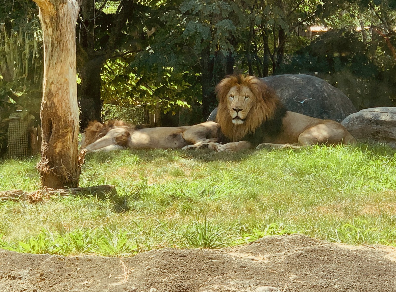Zoos Shouldn’t Exist

Despite their popularity, zoos aren’t as great as some may have you believe. In the long run, the animal kingdom seems to be better off without zoos.
It’s no doubt there is a plethora of love for animals in the U.S.. As a child, I used to go to zoos fairly often. I can’t deny it’s fun to see all of the exotic animals in the zoo, but should they really be there? The way I see it, zoos shouldn’t exist. Zoos are fun but they aren’t worth risking an animal’s well-being over. There are over 2,400 zoos in the U.S. alone. 2,400 zoos full of unhappy animals (1).
We go to the zoo because we like the animals inside. We look at the animals in their cages, and see nothing but their cuteness. What we don’t see is the repercussions that zoos bring regarding the safety of animals. The harming of the animals is brushed under the rug. If they’re fed and look safe and healthy on the outside, they must be okay…right?
Zoos claim they provide education on the animals, but do they really? The little plaques outside the cages state the basics about the animal. The plaques don’t talk about their natural behaviors the zoo has wiped away. Informational plaques glaze over the destruction they bring to the natural order of an animal’s life. Animal health in zoos is a much greater ordeal than just feeding them the appropriate diet. Being brought into the zoos tears animals away from their natural habitats and sometimes forces them to live in inhumane conditions. Within the cages, animals natural needs are rarely met. Natural mating and breeding behaviors are virtually erased by regulated feeding and breeding systems. Plus, the animals are closely confined and have little privacy, space to roam, and very little mental and physical exercise. The conditions of zoos cause abnormal and self destructive behaviors–which is defined as “Zoochosis.” Zoochosis is used to explain the behavior of animals in captivity. The behavior of animals with zoochosis is usually described as a repetitive behavior pattern with no apparent goal or function. Animals in captivity suffer from stress, depression, and display strange behaviors (2).
A study done my Oxford University was based on four decades of observing both animals in captivity and animals in the wild. The study found that animals such as polar bears, lions, tigers, and cheetahs exhibit the most signs of stress and/or psychological dysfunction when they’re kept in captivity. Psychological Dysfunction is a broad definition for psychological disorders. Experts and scientists who study elephants in the wild oppose their captures. They state that taking elephants from the wild is traumatic for them and detrimental to their health (2). Studies have been done to confirm the harmful repercussions of the capture of wild animals. Zoos are more of a prison than a home to the animals.
People wouldn’t want their pets confined to one space–one room within the house, so why should zoo animals be confined? If your pet would be miserable being confined to one space, what makes you think zoo animals wouldn’t be miserable as well? Zoo animals aren’t meant to be tamed and controlled. They are meant to live in the wild, free to engage in their natural ways of life. They are not puppets to be used for our own entertainment. Is the suffering of animals really worth our entertainment?
Animals are sentient beings. Like us, they have both physical and psychological needs. If those needs aren’t met, health will take a downfall. In zoos, animals are deprived of their needs. They deserve to stop being taken out of their natural habitats, and be treated with respect. Let’s do the right thing and stop confining animals to our ways. Instead, lets let them roam free and live their lives as they should: in the wild.
Citations
- 2,400 zoos in the U.S. alone (Cbs. “5 Largest Zoos In The United States.” CBS New York, CBS New York, 6 May 2016, newyork.cbslocal.com/top-lists/5-largest-zoos-america/.)
- “Zoos: Pitiful Prisons.” PETA, 16 Dec. 2003, www.peta.org/issues/animals-in-entertainment/animals-used-entertainment-factsheets/zoos-pitiful-prisons/.

Alyssa is a senior and 18 years old. Though she's technically an adult, she has the personality of a 6-year-old on a sugar high. Alyssa is normally quiet...








Asher • Feb 24, 2022 at 1:30 pm
Also, some zoos take animals that are injured in and treat them. Sure, some zoos don’t let them go but most zoos are perfectly fine.
Violet • Sep 17, 2020 at 10:51 am
I agree with taking animals from the wild but what about animals that were born in the zoo already? Then they never know anything other than the zoo they live in. Or what about zoos that rescue animals that either can’t live in the wild anymore or just need rehabilitation and are released? Some animals actually can’t go back to the wild because of an injury they got.
Noah Sucher • Feb 24, 2022 at 1:42 pm
this is true, the animals who cant adapt to the wild will die sooner than in captivity
layla • May 2, 2022 at 2:00 pm
i disagree with this statement because they get abused by workers or not fed and get to starve to death and also they get terribly hurt by tourists and staffs